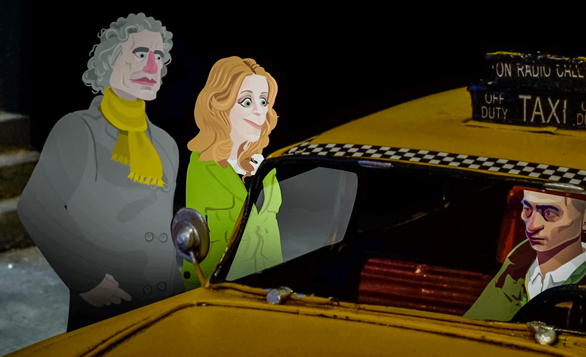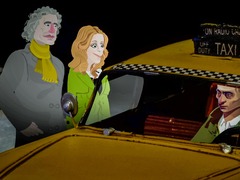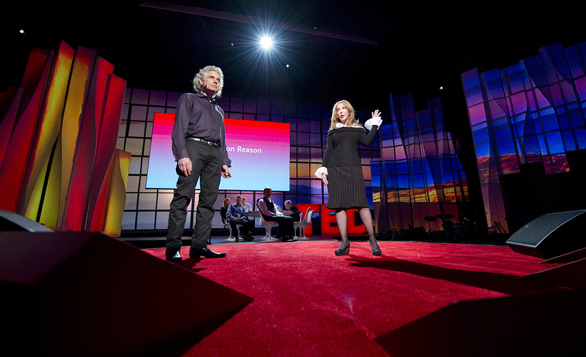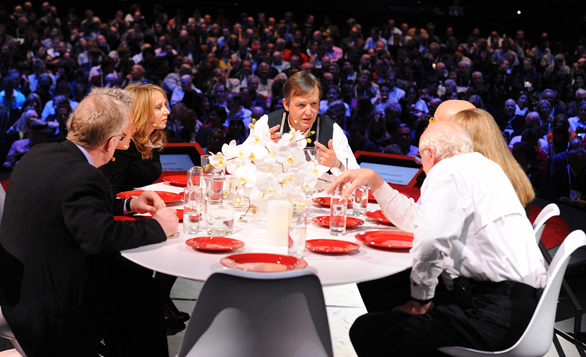
In today’s talk, “The Long Reach of Reason,” Steven Pinker and Rebecca Newberger Goldstein have been animated by Cognitive Media.
I want to give you the back story behind today’s TED Talk and make the case that it’s one of the most significant we’ve ever posted. And I’m not just talking about its incredible animation. I’m talking about its core idea.
Two years ago the psychologist Steven Pinker and the philosopher Rebecca Newberger Goldstein, who are married, came to TED to take part in a form of Socratic dialog.
 Steven Pinker and Rebecca Newberger Goldstein: The long reach of reason
She sought to argue that Reason was a much more powerful force in history than it’s normally given credit for. He initially defended the modern consensus among psychologists and neurologists, that most human behavior is best explained through other means: unconscious instincts of various kinds. But over the course of the dialog, he is persuaded by her, and together they look back through history and see how reasoned arguments ended up having massive impacts, even if those impacts sometimes took centuries to unfold.
Steven Pinker and Rebecca Newberger Goldstein: The long reach of reason
She sought to argue that Reason was a much more powerful force in history than it’s normally given credit for. He initially defended the modern consensus among psychologists and neurologists, that most human behavior is best explained through other means: unconscious instincts of various kinds. But over the course of the dialog, he is persuaded by her, and together they look back through history and see how reasoned arguments ended up having massive impacts, even if those impacts sometimes took centuries to unfold.
The script was clever, the argument powerful. However on the day, they bombed. And I’m mainly to blame.
You see, we gambled that year on seeking to expand our repertoire of presentation formats. Their dialog appeared in a session we called “The Dinner Party.” The idea was that all the speakers at the session would be seated around a table. They would individually give their talks, then come sit back down with the others to debate the talk, and everyone would end up the wiser. Seemed like an interesting idea at the time. But it didn’t work. Somehow the chemistry of the dinner guests never ignited. And perhaps the biggest reason for that was that I, as head of the table trying to moderate the conversation, had my back to the audience. The audience disengaged, the evening fell flat, and Steve and Rebecca’s dialog, which also suffered from some audio issues, was rated too low for us to consider posting it online.

At TED2012, Steven Pinker and Rebecca Newberger Goldstein explored how reason shaped human history. We’ve animated the talk to bring new life to this important idea. Photo: James Duncan Davidson
That would normally have been the end of it. Except that a strange thing happened. I could not get their core idea out of my head. The more I thought about it, the more I realized that TED’s entire mission rested on the premise that ideas really matter. And unless reasoned argument is the prime tool shaping those ideas, they can warp into pretty much anything, good or bad.
And so I tried to figure if there was a way to rescue the talk. And it turned out that there was. It came in the shape of Andrew Park, who, in my humble-but-true opinion is the world’s greatest animator of concepts. His RSA Animate series has notched up millions of views for sometimes difficult topics, and we have worked with him before to animate talks from Denis Dutton and some of our TED-Ed lessons (including one from yours truly on Questions No One Knows the Answer To.) If he could make me interesting, he sure as hell could do so for Pinker and Goldstein.
And so it turned out. Andrew and his amazing team at Cognitive fixed the audio issue and turned the entire talk into an animated movie of such imagination, humor and, most of all, explanatory power, it took my breath away.
And so here it is. The Long Reach of Reason. A talk in animated dialog form, arguing that Reason is capable of extending its influence across centuries, making it the single most powerful driver of long-term change. Please watch it. A) you’ll be blown away by how it’s animated. B) it may change forever how you think about Reason. And that’s a good thing.
It is a delicious example in favor of the talk’s conclusions that it was the power of its own arguments that kept it alive and turned it into a animation capable of far greater reach than the original.
For me, the argument in this talk is ultimately a profoundly optimistic one. If it turns out to be valid, then there really can be such a thing in the world as moral progress. People are genuinely capable of arguing each other into new beliefs, new mindsets that ultimately will benefit humanity. If you think that’s unlikely, watch the talk. You might just find yourself reasoned to a different opinion.

Comments (20)
Pingback: Understanding TED’s approach to the world – E-Commercial Angles
Pingback: An interesting case of persuasion: – carolinadelucablog
Pingback: TED isn’t a cult. Here’s what attendees actually believe
Pingback: TED isn't a cult. Here's what attendees actually believe | ..:: Frog in the box ::.. | ..:: Frog in the box ::..
Pingback: TED isn't a cult. Here's what attendees actually believe – Technology Insider
Pingback: TED isn’t a cult. Here’s what attendees actually believe | Digital Wealth
Pingback: TED isn't a cult. Here's what attendees actually believe
Pingback: TED isn't a cult. Right here's what attendees truly consider | GsmarenaClone
Pingback: TED isn't a cult. Here's what attendees actually believe - bns24.com
Pingback: TED isn't a cult. Here's what attendees actually believe – Rhetoric News
Pingback: The Best Theory Of Knowledge Resources In 2014 – So Far | Larry Ferlazzo’s Websites of the Day…
Pingback: The Best Videos For Educators In 2014 – So Far | Larry Ferlazzo’s Websites of the Day…
Pingback: Health Activists Jailed | Plato on-line
Pingback: “The Long Reach Of Reason” – It’s A Safe Bet That This New TED Talk Animation Will Be Shown In Every TOK Class | Educational Policy Information
Pingback: “The Long Reach Of Reason” – It’s A Safe Bet That This New TED Talk Animation Will Be Shown In Every TOK Class | Larry Ferlazzo’s Websites of the Day…